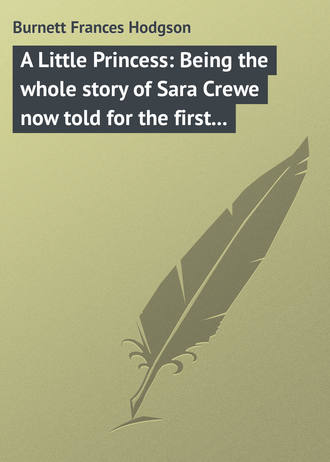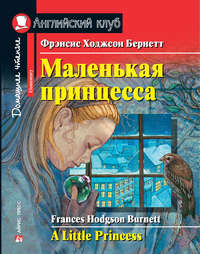 полная версия
полная версияA Little Princess: Being the whole story of Sara Crewe now told for the first time
She sprang up and clutched at her cap. She felt it dangling over her ear, and tried wildly to put it straight. Oh, she had got herself into trouble now with a vengeance! To have impudently fallen asleep on such a young lady’s chair! She would be turned out of doors without wages.
She made a sound like a big breathless sob.
“Oh, miss! Oh, miss!” she stuttered. “I arst yer pardon, miss! Oh, I do, miss!”
Sara jumped down, and came quite close to her.
“Don’t be frightened,” she said, quite as if she had been speaking to a little girl like herself. “It doesn’t matter the least bit.”
“I didn’t go to do it, miss,” protested Becky. “It was the warm fire – an’ me bein’ so tired. It – it wasn’t imperence!”
Sara broke into a friendly little laugh, and put her hand on her shoulder.
“You were tired,” she said; “you could not help it. You are not really awake yet.”
How poor Becky stared at her! In fact, she had never heard such a nice, friendly sound in any one’s voice before. She was used to being ordered about and scolded, and having her ears boxed. And this one – in her rose-colored dancing afternoon splendor – was looking at her as if she were not a culprit at all – as if she had a right to be tired – even to fall asleep! The touch of the soft, slim little paw on her shoulder was the most amazing thing she had ever known.
“Ain’t – ain’t yer angry, miss?” she gasped. “Ain’t yer goin’ to tell the missus?”
“No,” cried out Sara. “Of course I’m not.”
The woful fright in the coal-smutted face made her suddenly so sorry that she could scarcely bear it. One of her queer thoughts rushed into her mind. She put her hand against Becky’s cheek.
“Why,” she said, “we are just the same – I am only a little girl like you. It’s just an accident that I am not you, and you are not me!”
Becky did not understand in the least. Her mind could not grasp such amazing thoughts, and “an accident” meant to her a calamity in which some one was run over or fell off a ladder and was carried to “the ’orspital.”
“A’ accident, miss,” she fluttered respectfully. “Is it?”
“Yes,” Sara answered, and she looked at her dreamily for a moment. But the next she spoke in a different tone. She realized that Becky did not know what she meant.
“Have you done your work?” she asked. “Dare you stay here a few minutes?”
Becky lost her breath again.
“Here, miss? Me?”
Sara ran to the door, opened it, and looked out and listened.
“No one is anywhere about,” she explained. “If your bedrooms are finished, perhaps you might stay a tiny while. I thought – perhaps – you might like a piece of cake.”
The next ten minutes seemed to Becky like a sort of delirium. Sara opened a cupboard, and gave her a thick slice of cake. She seemed to rejoice when it was devoured in hungry bites. She talked and asked questions, and laughed until Becky’s fears actually began to calm themselves, and she once or twice gathered boldness enough to ask a question or so herself, daring as she felt it to be.
“Is that – ” she ventured, looking longingly at the rose-colored frock. And she asked it almost in a whisper. “Is that there your best?”
“It is one of my dancing-frocks,” answered Sara. “I like it, don’t you?”
For a few seconds Becky was almost speechless with admiration. Then she said in an awed voice:
“Onct I see a princess. I was standin’ in the street with the crowd outside Covin’ Garden, watchin’ the swells go inter the operer. An’ there was one every one stared at most. They ses to each other, ‘That’s the princess.’ She was a growed-up young lady, but she was pink all over – gownd an’ cloak, an’ flowers an’ all. I called her to mind the minnit I see you, sittin’ there on the table, miss. You looked like her.”
“I’ve often thought,” said Sara, in her reflecting voice, “that I should like to be a princess; I wonder what it feels like. I believe I will begin pretending I am one.”
Becky stared at her admiringly, and, as before, did not understand her in the least. She watched her with a sort of adoration. Very soon Sara left her reflections and turned to her with a new question.
“Becky,” she said, “weren’t you listening to that story?”
“Yes, miss,” confessed Becky, a little alarmed again. “I knowed I hadn’t orter, but it was that beautiful I – I couldn’t help it.”
“I liked you to listen to it,” said Sara. “If you tell stories, you like nothing so much as to tell them to people who want to listen. I don’t know why it is. Would you like to hear the rest?”
Becky lost her breath again.
“Me hear it?” she cried. “Like as if I was a pupil, miss! All about the Prince – and the little white Merbabies swimming about laughing – with stars in their hair?”
Sara nodded.
“You haven’t time to hear it now, I’m afraid,” she said; “but if you will tell me just what time you come to do my rooms, I will try to be here and tell you a bit of it every day until it is finished. It’s a lovely long one – and I’m always putting new bits to it.”
“Then,” breathed Becky, devoutly, “I wouldn’t mind how heavy the coal-boxes was – or what the cook done to me, if – if I might have that to think of.”
“You may,” said Sara. “I’ll tell it all to you.”
When Becky went down-stairs, she was not the same Becky who had staggered up, loaded down by the weight of the coal-scuttle. She had an extra piece of cake in her pocket, and she had been fed and warmed, but not only by cake and fire. Something else had warmed and fed her, and the something else was Sara.
When she was gone Sara sat on her favorite perch on the end of her table. Her feet were on a chair, her elbows on her knees, and her chin in her hands.
“If I was a princess – a real princess,” she murmured, “I could scatter largess to the populace. But even if I am only a pretend princess, I can invent little things to do for people. Things like this. She was just as happy as if it was largess. I’ll pretend that to do things people like is scattering largess. I’ve scattered largess.”
CHAPTER VI
THE DIAMOND-MINES
Not very long after this a very exciting thing happened. Not only Sara, but the entire school, found it exciting, and made it the chief subject of conversation for weeks after it occurred. In one of his letters Captain Crewe told a most interesting story. A friend who had been at school with him when he was a boy had unexpectedly come to see him in India. He was the owner of a large tract of land upon which diamonds had been found, and he was engaged in developing the mines. If all went as was confidently expected, he would become possessed of such wealth as it made one dizzy to think of; and because he was fond of the friend of his school-days, he had given him an opportunity to share in this enormous fortune by becoming a partner in his scheme. This, at least, was what Sara gathered from his letters. It is true that any other business scheme, however magnificent, would have had but small attraction for her or for the school-room; but “diamond-mines” sounded so like the “Arabian Nights” that no one could be indifferent. Sara thought them enchanting, and painted pictures, for Ermengarde and Lottie, of labyrinthine passages in the bowels of the earth, where sparkling stones studded the walls and roofs and ceilings, and strange, dark men dug them out with heavy picks. Ermengarde delighted in the story, and Lottie insisted on its being retold to her every evening. Lavinia was very spiteful about it, and told Jessie that she didn’t believe such things as diamond-mines existed.
“My mamma has a diamond ring which cost forty pounds,” she said. “And it is not a big one, either. If there were mines full of diamonds, people would be so rich it would be ridiculous.”
“Perhaps Sara will be so rich that she will be ridiculous,” giggled Jessie.
“She’s ridiculous without being rich,” Lavinia sniffed.
“I believe you hate her,” said Jessie.
“No, I don’t,” snapped Lavinia. “But I don’t believe in mines full of diamonds.”
“Well, people have to get them from somewhere,” said Jessie. “Lavinia,” – with a new giggle, – “what do you think Gertrude says?”
“I don’t know, I’m sure; and I don’t care if it’s something more about that everlasting Sara.”
“Well, it is. One of her ‘pretends’ is that she is a princess. She plays it all the time – even in school. She says it makes her learn her lessons better. She wants Ermengarde to be one, too, but Ermengarde says she is too fat.”
“She is too fat,” said Lavinia. “And Sara is too thin.”
Naturally, Jessie giggled again.
“She says it has nothing to do with what you look like, or what you have. It has only to do with what you think of, and what you do.”
“I suppose she thinks she could be a princess if she was a beggar,” said Lavinia. “Let us begin to call her Your Royal Highness.”
Lessons for the day were over, and they were sitting before the school-room fire, enjoying the time they liked best. It was the time when Miss Minchin and Miss Amelia were taking their tea in the sitting-room sacred to themselves. At this hour a great deal of talking was done, and a great many secrets changed hands, particularly if the younger pupils behaved themselves well, and did not squabble or run about noisily, which it must be confessed they usually did. When they made an uproar the older girls usually interfered with scoldings and shakes. They were expected to keep order, and there was danger that if they did not, Miss Minchin or Miss Amelia would appear and put an end to festivities. Even as Lavinia spoke the door opened and Sara entered with Lottie, whose habit was to trot everywhere after her like a little dog.
“There she is, with that horrid child!” exclaimed Lavinia, in a whisper. “If she’s so fond of her, why doesn’t she keep her in her own room? She will begin howling about something in five minutes.”
It happened that Lottie had been seized with a sudden desire to play in the school-room, and had begged her adopted parent to come with her. She joined a group of little ones who were playing in a corner. Sara curled herself up in the window-seat, opened a book, and began to read. It was a book about the French Revolution, and she was soon lost in a harrowing picture of the prisoners in the Bastille – men who had spent so many years in dungeons that when they were dragged out by those who rescued them, their long, gray hair and beards almost hid their faces, and they had forgotten that an outside world existed at all, and were like beings in a dream.
She was so far away from the school-room that it was not agreeable to be dragged back suddenly by a howl from Lottie. Never did she find anything so difficult as to keep herself from losing her temper when she was suddenly disturbed while absorbed in a book. People who are fond of books know the feeling of irritation which sweeps over them at such a moment. The temptation to be unreasonable and snappish is one not easy to manage.
“It makes me feel as if some one had hit me,” Sara had told Ermengarde once in confidence. “And as if I want to hit back. I have to remember things quickly to keep from saying something ill-tempered.”
She had to remember things quickly when she laid her book on the window-seat and jumped down from her comfortable corner.
Lottie had been sliding across the school-room floor, and, having first irritated Lavinia and Jessie by making a noise, had ended by falling down and hurting her fat knee. She was screaming and dancing up and down in the midst of a group of friends and enemies, who were alternately coaxing and scolding her.
“Stop this minute, you cry-baby! Stop this minute!” Lavinia commanded.
“I’m not a cry-baby – I’m not!” wailed Lottie. “Sara, Sa – ra!”
“If she doesn’t stop, Miss Minchin will hear her,” cried Jessie. “Lottie darling, I’ll give you a penny!”
“I don’t want your penny,” sobbed Lottie; and she looked down at the fat knee, and, seeing a drop of blood on it, burst forth again.
Sara flew across the room and, kneeling down, put her arms round her.
“Now, Lottie,” she said. “Now, Lottie, you promised Sara.”
“She said I was a cry-baby,” wept Lottie.
Sara patted her, but spoke in the steady voice Lottie knew.
“But if you cry, you will be one, Lottie pet. You promised.”
Lottie remembered that she had promised, but she preferred to lift up her voice.
“I haven’t any mamma,” she proclaimed. “I haven’t – a bit – of mamma.”
“Yes, you have,” said Sara, cheerfully. “Have you forgotten? Don’t you know that Sara is your mamma? Don’t you want Sara for your mamma?”
Lottie cuddled up to her with a consoled sniff.
“Come and sit in the window-seat with me,” Sara went on, “and I’ll whisper a story to you.”
“Will you?” whimpered Lottie. “Will you – tell me – about the diamond-mines?”
“The diamond-mines?” broke out Lavinia. “Nasty, little spoiled thing, I should like to slap her!”
Sara got up quickly on her feet. It must be remembered that she had been very deeply absorbed in the book about the Bastille, and she had had to recall several things rapidly when she realized that she must go and take care of her adopted child. She was not an angel, and she was not fond of Lavinia.
“Well,” she said, with some fire, “I should like to slap you, – but I don’t want to slap you!” restraining herself. “At least I both want to slap you – and I should like to slap you, – but I won’t slap you. We are not little gutter children. We are both old enough to know better.”
Here was Lavinia’s opportunity.
“Ah, yes, your royal highness,” she said. “We are princesses, I believe. At least one of us is. The school ought to be very fashionable now Miss Minchin has a princess for a pupil.”
Sara started toward her. She looked as if she were going to box her ears. Perhaps she was. Her trick of pretending things was the joy of her life. She never spoke of it to girls she was not fond of. Her new “pretend” about being a princess was very near to her heart, and she was shy and sensitive about it. She had meant it to be rather a secret, and here was Lavinia deriding it before nearly all the school. She felt the blood rush up into her face and tingle in her ears. She only just saved herself. If you were a princess, you did not fly into rages. Her hand dropped, and she stood quite still a moment. When she spoke it was in a quiet, steady voice; she held her head up, and everybody listened to her.
“It’s true,” she said. “Sometimes I do pretend I am a princess. I pretend I am a princess, so that I can try and behave like one.”
Lavinia could not think of exactly the right thing to say. Several times she had found that she could not think of a satisfactory reply when she was dealing with Sara. The reason of this was that, somehow, the rest always seemed to be vaguely in sympathy with her opponent. She saw now that they were pricking up their ears interestedly. The truth was, they liked princesses, and they all hoped they might hear something more definite about this one, and drew nearer Sara accordingly.
Lavinia could only invent one remark, and it fell rather flat.
“Dear me!” she said; “I hope, when you ascend the throne, you won’t forget us.”
“I won’t,” said Sara, and she did not utter another word, but stood quite still, and stared at her steadily as she saw her take Jessie’s arm and turn away.
After this, the girls who were jealous of her used to speak of her as “Princess Sara” whenever they wished to be particularly disdainful, and those who were fond of her gave her the name among themselves as a term of affection. No one called her “princess” instead of “Sara,” but her adorers were much pleased with the picturesqueness and grandeur of the title, and Miss Minchin, hearing of it, mentioned it more than once to visiting parents, feeling that it rather suggested a sort of royal boarding-school.
To Becky it seemed the most appropriate thing in the world. The acquaintance begun on the foggy afternoon when she had jumped up terrified from her sleep in the comfortable chair, had ripened and grown, though it must be confessed that Miss Minchin and Miss Amelia knew very little about it. They were aware that Sara was “kind” to the scullery-maid, but they knew nothing of certain delightful moments snatched perilously when, the up-stairs rooms being set in order with lightning rapidity, Sara’s sitting-room was reached, and the heavy coal-box set down with a sigh of joy. At such times stories were told by instalments, things of a satisfying nature were either produced and eaten or hastily tucked into pockets to be disposed of at night, when Becky went up-stairs to her attic to bed.
“But I has to eat ’em careful, miss,” she said once; “’cos if I leaves crumbs the rats come out to get ’em.”
“Rats!” exclaimed Sara, in horror. “Are there rats there?”
“Lots of ’em, miss,” Becky answered in quite a matter-of-fact manner. “There mostly is rats an’ mice in attics. You gets used to the noise they makes scuttling about. I’ve got so I don’t mind ’em s’ long as they don’t run over my piller.”
“Ugh!” said Sara.
“You gets used to anythin’ after a bit,” said Becky. “You have to, miss, if you’re born a scullery-maid. I’d rather have rats than cockroaches.”
“So would I,” said Sara; “I suppose you might make friends with a rat in time, but I don’t believe I should like to make friends with a cockroach.”
Sometimes Becky did not dare to spend more than a few minutes in the bright, warm room, and when this was the case perhaps only a few words could be exchanged, and a small purchase slipped into the old-fashioned pocket Becky carried under her dress skirt, tied round her waist with a band of tape. The search for and discovery of satisfying things to eat which could be packed into small compass, added a new interest to Sara’s existence. When she drove or walked out, she used to look into shop windows eagerly. The first time it occurred to her to bring home two or three little meat-pies, she felt that she had hit upon a discovery. When she exhibited them, Becky’s eyes quite sparkled.
“Oh, miss!” she murmured. “Them will be nice an’ fillin’. It’s fillin’ness that’s best. Sponge-cake’s a ’evingly thing, but it melts away like – if you understand, miss. These’ll just stay in yer stummick.”
“Well,” hesitated Sara, “I don’t think it would be good if they stayed always, but I do believe they will be satisfying.”
They were satisfying, – and so were beef sandwiches, bought at a cook-shop, – and so were rolls and Bologna sausage. In time, Becky began to lose her hungry, tired feeling, and the coal-box did not seem so unbearably heavy.
However heavy it was, and whatsoever the temper of the cook, and the hardness of the work heaped upon her shoulders, she had always the chance of the afternoon to look forward to – the chance that Miss Sara would be able to be in her sitting-room. In fact, the mere seeing of Miss Sara would have been enough without meat-pies. If there was time only for a few words, they were always friendly, merry words that put heart into one; and if there was time for more, then there was an instalment of a story to be told, or some other thing one remembered afterward and sometimes lay awake in one’s bed in the attic to think over. Sara – who was only doing what she unconsciously liked better than anything else, Nature having made her for a giver – had not the least idea what she meant to poor Becky, and how wonderful a benefactor she seemed. If Nature has made you for a giver, your hands are born open, and so is your heart; and though there may be times when your hands are empty, your heart is always full, and you can give things out of that – warm things, kind things, sweet things, – help and comfort and laughter, – and sometimes gay, kind laughter is the best help of all.
Becky had scarcely known what laughter was through all her poor, little hard-driven life. Sara made her laugh, and laughed with her; and, though neither of them quite knew it, the laughter was as “fillin’” as the meat-pies.
A few weeks before Sara’s eleventh birthday a letter came to her from her father, which did not seem to be written in such boyish high spirits as usual. He was not very well, and was evidently overweighted by the business connected with the diamond-mines.
“You see, little Sara,” he wrote, “your daddy is not a business man at all, and figures and documents bother him. He does not really understand them, and all this seems so enormous. Perhaps, if I was not feverish I should not be awake, tossing about, one half of the night and spend the other half in troublesome dreams. If my little missus were here, I dare say she would give me some solemn, good advice. You would, wouldn’t you, little missus?”
One of his many jokes had been to call her his “little missus” because she had such an old-fashioned air.
He had made wonderful preparations for her birthday. Among other things, a new doll had been ordered in Paris, and her wardrobe was to be, indeed, a marvel of splendid perfection. When she had replied to the letter asking her if the doll would be an acceptable present, Sara had been very quaint.
“I am getting very old,” she wrote; “you see, I shall never live to have another doll given me. This will be my last doll. There is something solemn about it. If I could write poetry, I am sure a poem about ‘A Last Doll’ would be very nice. But I cannot write poetry. I have tried, and it made me laugh. It did not sound like Watts or Coleridge or Shakespeare at all. No one could ever take Emily’s place, but I should respect the Last Doll very much; and I am sure the school would love it. They all like dolls, though some of the big ones – the almost fifteen ones – pretend they are too grown up.”
Captain Crewe had a splitting headache when he read this letter in his bungalow in India. The table before him was heaped with papers and letters which were alarming him and filling him with anxious dread, but he laughed as he had not laughed for weeks.
“Oh,” he said, “she’s better fun every year she lives. God grant this business may right itself and leave me free to run home and see her. What wouldn’t I give to have her little arms round my neck this minute! What wouldn’t I give!”
The birthday was to be celebrated by great festivities. The school-room was to be decorated, and there was to be a party. The boxes containing the presents were to be opened with great ceremony, and there was to be a glittering feast spread in Miss Minchin’s sacred room. When the day arrived the whole house was in a whirl of excitement. How the morning passed nobody quite knew, because there seemed such preparations to be made. The school-room was being decked with garlands of holly; the desks had been moved away, and red covers had been put on the forms which were arrayed round the room against the wall.
When Sara went into her sitting-room in the morning, she found on the table a small, dumpy package, tied up in a piece of brown paper. She knew it was a present, and she thought she could guess whom it came from. She opened it quite tenderly. It was a square pincushion, made of not quite clean red flannel, and black pins had been stuck carefully into it to form the words, “Menny hapy returns.”
“Oh!” cried Sara, with a warm feeling in her heart. “What pains she has taken! I like it so, it – it makes me feel sorrowful.”
But the next moment she was mystified. On the under side of the pincushion was secured a card, bearing in neat letters the name “Miss Amelia Minchin.”
Sara turned it over and over.
“Miss Amelia!” she said to herself. “How can it be!”
And just at that very moment she heard the door being cautiously pushed open and saw Becky peeping round it.
There was an affectionate, happy grin on her face, and she shuffled forward and stood nervously pulling at her fingers.
“Do yer like it, Miss Sara?” she said. “Do yer?”
“Like it?” cried Sara. “You darling Becky, you made it all yourself.”
Becky gave a hysteric but joyful sniff, and her eyes looked quite moist with delight.
“It ain’t nothin’ but flannin, an’ the flannin ain’t new; but I wanted to give yer somethin’ an’ I made it of nights. I knew yer could pretend it was satin with diamond pins in. I tried to when I was makin’ it. The card, miss,” rather doubtfully; “’t warn’t wrong of me to pick it up out o’ the dust-bin, was it? Miss ’Meliar had throwed it away. I hadn’t no card o’ my own, an’ I knowed it wouldn’t be a proper presink if I didn’t pin a card on – so I pinned Miss ’Meliar’s.”









